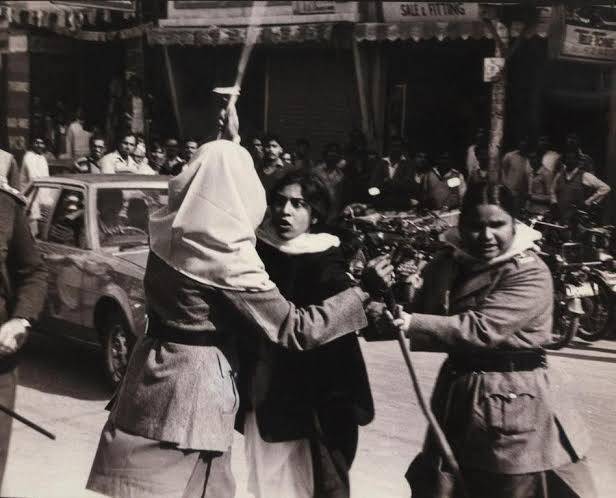Na monh chupa kay jeeyae hum na sir jhuka kay jeyae
Sitamgaron key nazar say nazar mila kay jeyae
Abb aik raat agar kum jeyae tu kum he sahi
Yahi bohat hai kay hum mashalain jala kay jeyae
We did not live hiding our face or with bowed head
We lived staring in the eyes of the tormentors
We may have lived one night less but so what
It is enough that we lived spreading light in darkness
(Sahir Ludihanvi)
No one fits these words better than Asma Jahangir whose first death anniversary we celebrate today. The word celebrate in context of death looks odd for it projects a sense of something joyous but the fact is that despite the sadness at the loss the lives of people like Asma Jahangir should be celebrated in their death.
It is very hard to write something on Asma Jahangir, not because it is difficult to think of what to write but there is so much to write that it is impossible to decide what to omit. She lived a life and did things that were so immense that not one but several books are required to do justice to her and I feel pity for the person who would undertake the job of writing her biography.
Asma Jahangir was a lawyer by profession but it was as a human rights activist that she became the voice and hope for those who had no voice or hope. And starting from 1983 when she became the first person who openly came out in protest against the draconian laws brought in by Zia-ul-Haq she was at the forefront of every campaign or case where it was needed to fight oppression or to provide justice. And so she defied dictators and fought for democracy, stood up for the rights of women, of minorities, bonded labour, defended those accused of blasphemy, demanded justice for victims of rape and honour killing, protested and provided help to those protesting human rights violations in Kashmir, Iran and beyound, demanded release of those who disappear either because they were journalists writing that was not liked or nationalists in Sind or Baluchistan, the list as I said is endless.
Those who were fortunate enough to have met Asma Jahangir and to work with her have described her as a maverick, as someone who thought outside the box, who would not follow a predictable formula to find solutions to problems but invent her own formula. And here was her greatest strength: That she did not just feel sorry for the wronged, did not just protest for them but constantly thought, planned and pleaded their case with solid evidence and unbeatable arguments.
Last year when I was visiting Lahore I heard the news of Asma Jahangir’s death and my first thought was that greater than the shock of her death is the surprise that she managed to live this long and died a natural death. No doubt Asma Jahangir faced constant threats from establishment and well as militants. And it should be mentioned here that she was a person of immaculate principles which can be judged by the fact that she petitioned against drone attacks as she considered this as extra-judicial killings despite the fact that the attacks were killing the very militants who were threatening her life. I am sure there are other examples of Asma Jahangir coming to the defence of those who were her enemies when she thought they were not getting justice.
Asma Jahangir did in one lifetime what people manage in several, and we should not forget that she was also a wife and mother who raised 3 children.
Asma Jahangir remained a maverick even in death for I remember how at her funeral men and women stood side by side to offer the funeral prayer despite the attempts by the religious to stop this as normally women are not allowed to offer funeral prayer or have to do this separately.
Since her death Asma Jahangir has received The United Nations Prize in Field of Human Rights as well as Nishan-A-Imtiaz (the highest civilian award of Pakistan) however she would be much happier if instead of getting awards her work is continued. And for this reason it is important to keep her memory alive. Fortunately Asma Jahangir did not create a personality cult but worked tirelessly to create institutions knowing well that our lives are finite but institutions can continue the good work afterwards.
And it is vital that her work is continued for sadly we are living in a world that is becoming more and more intolerant every day. With dismay we look at the rise of religious fanaticism and/or hyper-nationalism all over the world. In Pakistan while there is apparent democracy and press freedom the reality is that certain institutions are outside the scope of such freedoms and criticising them can lead to dire consequences. I have heard so many stories of men who have simply disappeared. Some do return often wrecked for life and others are never heard of. There is no better homage to the memory of Asma Jahangir than to speak up and raise our voices for this and other injustices done in our societies. To quote another version of Martin Niemöller poem:
First they came for the blasphemers, and I did not speak out—
Because I was not a blasphemer.
Then they came for the journalists, and I did not speak out—
Because I was not a journalist.
Then they came for the human rights activists, and I did not speak out—
Because I was not a activist.
Then they came for me—and there was no one left to speak for me.






